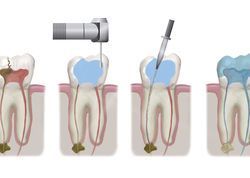Get in touch
(334) 277-3492
messages@jawdocs.net
(334) 277-3492
LOCATIONS PATIENT REGISTRATION
Candidates for Endodontic Surgery
In situations where a traditional root canal will not adequately treat a tooth infection, or when diagnostic techniques do not reveal the cause of your symptoms, our doctors will often recommend endodontic surgery. By undergoing endodontic surgery, we can examine the entire root of your tooth and remove infected pulp from the deep recesses (called canals) so that you can avoid extraction. Our endodontists are highly trained specialists who can identify good candidates for endodontic surgery at our Montgomery, AL, practice. If you are experiencing symptoms of advanced tooth decay, contact Oral & Maxillofacial Surgery Associates today and schedule a personal consultation.
Why Is Endodontic Surgery Performed?
Endodontic surgery is frequently recommended for patients who have undergone traditional root canal therapy and still continue to experience symptoms such as pain or swelling of the gums. In some cases, these symptoms can develop months or even years after the original root canal treatment. With endodontic surgery, your doctor can:
- Remove calcium deposits that have made a tooth canal too narrow to be reached with conventional root canal tools
- Treat an infection that has developed after root canal therapy
- Treat root surfaces or bone that surrounds tooth roots when they are compromised by damage or decay
Additionally, endodontic surgery is often used as a diagnostic tool when the cause of your concerns cannot be identified through dental x-rays or other diagnostic tools.
Types of Endodontic Surgery
The most commonly performed type of endodontic surgery is known as apicoectomy. During an apicoectomy, your doctor will first administer anesthesia to ensure your comfort. Next, he or she will make a small incision in your gums before lifting tissue away from the tooth and bone. Inflamed and infected portions are removed through the root tip, and in some cases, the root itself is removed in a procedure called root resection. Depending on your unique needs, we may seal the end of the root canal with a filling to prevent future infection. To complete your apicoectomy, the doctor will suture the incisions closed, and the bone around the tooth root will be left to heal.
Another form of endodontic surgery is intentional replantation, which is performed in cases where a patient's anatomy makes it difficult to access a severely infected tooth. This procedure involves extracting a damaged tooth, treating it outside the mouth, and then replacing it back into its original socket.
Alternatives to Endodontic Surgery
The goal of endodontic surgery is to maintain as much of your natural tooth as possible and avoid the need for extraction. However, if you find that you are not a good candidate for endodontic surgery, we can perform a gentle extraction using anesthesia and plan a dental implants treatment to restore the strength, function, and aesthetics of your smile. Unlike traditional restorative treatments, replacing a tooth with a dental implant-supported crown can prevent jawbone atrophy and provide an unparalleled level of strength.
Schedule an Appointment to Learn More
To discover if you are a candidate for endodontic surgery, schedule a personal consultation today.

